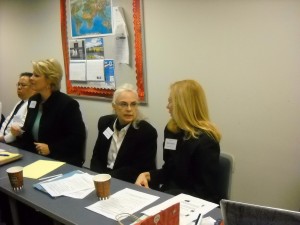Here is the letter that is sent to every petitioner for a dissolution of marriage (divorce) in Los Angeles County. Do people ever read this? It is good and wise advice. Today I had lunch with a lawyer who was just back from a morning in court in LA; he told of the horrible way parents are treating each other in court, meaning their children suffer also.
CHAMBERS OF THE SUPERIOR COURT, FAMILY LAW DEPARTMENTS
LOS ANGELES, CALIFORNIA 90012 TELEPHONE (213 )9741234
MARJORIE S. STEINBERG, SUPERVISING JUDGE
Dear Petitioner or Respondent:
You have a Family Law case in our court. During this time in your life, you have a number of decisions to make about your future and perhaps the future of your children. I would like you to know that our court would like to help make this process as easy as possible for you and your family.
You may have a dispute with your spouse regarding where your children will live, what support will be provided and how you will divide your property. You have the right to have a court hearing and have a judicial officer decide these matters for you, which may be the most appropriate way to proceed, especially if you feel threatened by or fearful of your spouse.
However, going to court is not the only way to resolve family law disputes. Some other ways include having attorneys negotiate directly, having a neutral third party help both sides negotiate a solution (mediation) or using a method such as collaborative law. These other ways may help people find solutions that are mutually acceptable and may be preferable for several reasons: 1) You will directly participate in finding solutions; 2) You probably will be able to resolve your dispute sooner; 3) It may be much less expensive; 4) You may end the process with a better relationship with your former spouse; and 5) You will likely find it less stressful than court hearings. You can speak with your attorney, if you have one, about all of these methods of resolving your case so the two of you can decide which method may be best for you.
It is to your benefit to consider opportunities to reduce conflict and reduce expenses incurred in the Family Law process. I recommend that you focus on what is most important. Many people spend time, effort and money attempting to obtain satisfaction by prolonging the dispute with the other party, but this does not guarantee either party will be fully satisfied with the outcome.
If you have children, you must be particularly careful in choosing how to proceed. Everything you can do to avoid involving them in the dispute or engaging in conflict concerning them will benefit them and you. Your agreement does not need to be perfect. It does need to be acceptable to both of you. For the mediation of disputes regarding your child(ren) and how they will spend time with each parent after the divorce, the court offers a free mediation service through Family Court Services. To make an appointment, call (213) 974-5524.
Please save this letter. Please read it several times during the dissolution process.
Sincerely,
Marjorie S. Steinbert, Supervising Judge, Family Law Departments




